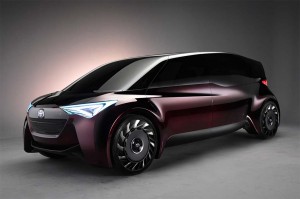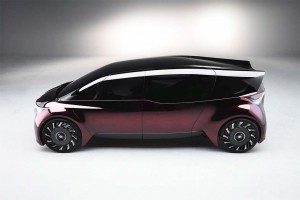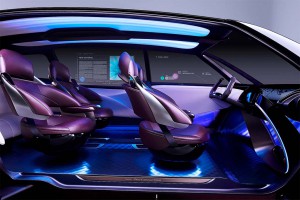
Toyota's Fine-Comfort Ride concept coming to the Tokyo Motor Show demonstrates the maker hasn't given up on fuel cells.
Though Toyota appears to be shifting some of its considerable resources into the development of battery-electric vehicles, the automaker isn’t walking away from its commitment to hydrogen power – as it plans to demonstrate at the upcoming Tokyo Motor Show with the debut of the Fine-Comfort Ride concept vehicle.
The prototype is barely a foot longer than the familiar Toyota Prius but because of the distinctive powertrain, the layout offers about as much interior space as a Mercedes-Benz S-Class. Meanwhile, with an estimate range of 1,000 kilometers, or 620 miles between fill-ups, the Fine-Comfort Ride would deliver about twice the range of Toyota’s current production hydrogen fuel-cell vehicle, the Mirai.
Toyota is billing the Tokyo Motor Show concept vehicle as “a new form of premium saloon,” and says it wants passenger to feel like they are “being wrapped in comfort,” rather than simply go along for a ride.
(GM talking with U.S. Army about developing new fuel-cell vehicle. For the story, Click Here.)
Though the automaker apparently left out some details from a news release issued ahead of the biennial Tokyo show, it hints at integrating an “Agent function,” which suggests it will offer autonomous and AI capabilities, in line with another prototype, the Concept-i, it will show off later this month. That model features artificial intelligence capable of reading a motorist’s emotions, Toyota said.
As for the Fine-Comfort Ride, “The Agent function and the touch display are arranged around the driver and passenger seats,” Toyota says, somewhat cryptically. “The seats allow for flexible adjustment according to posture, and the displays allow the driver and passengers to freely access information. The seat layout can be flexibly adjusted, so Fine-Comfort Ride can be used as individual space or as a communication space for individuals.”

Toyota's Fine-Comfort Ride fuel cell-powered concept car can travel more than 600 miles before refueling.
While there is certain to be plenty of smart technology available in the cabin, what’s particularly intriguing about the Toyota Fine-Comfort Ride, however, is its powertrain system.
The six-seater boasts a next-generation fuel-cell stack. While details are scarce, it appears that all key hardware has been moved, either to the vehicle’s corners or under its floorboards. Significantly, the Toyota concept adopts in-wheel motors, allowing the wheels to be moved right to the corners of the vehicle.
(Click Here for details about Toyota’s efforts to work with Japan on pushing fuel cells.)
The entire vehicle measures just 190.1 inches nose-to-tail, or about 11.8 inches longer than today’s fourth-generation Toyota Prius. Its wheelbase is 135.8 inches, meanwhile, and because of the extraordinarily short overhangs, it features a cabin that is longer – and wider – than an S-Class.
A number of automakers have been toying with the idea of using wheel motors. The question is whether Toyota is signaling it may be ready introduce them into production.
One other question likely to pop up during the Toyota news conference at the Tokyo Motor Show on Oct. 25, what sort of storage system the Fine-Comfort Ride is using? Hydrogen needs to be compressed at great pressures to deliver any substantial range – typically 10,000 psi with vehicles like the Toyota Mirai and the competing Honda Clarity FCV.

Toyota wants passengers in the Fine-Comfort Ride to feel like they're being wrapped in luxury, not going for a ride.
A range of 620 miles would not just make it possible to go for long drives – and possibly for weeks at a time – without fueling up, but would help address the fuel-cell vehicle’s equivalent of range anxiety. There are only a few dozen service stations offering the gas to the public in the entire U.S. right now, and not many more in Japan, though that country, as well as the state of California, are both pushing to develop a more robust hydrogen infrastructure.
(Click Here for more on Toyota’s fuel-cell truck project.)
Unless and until that happens, skeptics caution, hydrogen power is likely to remain a fuel of the future.
